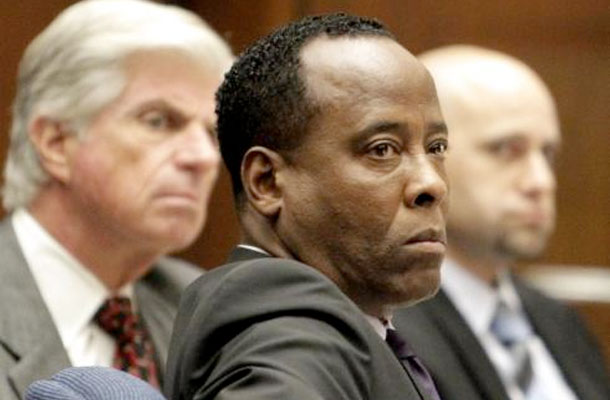On Wednesday, prosecutor David Walgren called up his last witness, Dr. Steven Shafer, in the involuntary manslaughter case against Dr. Conrad Murray. The medical expert testified that the defendant, Murray, committed 17 flagrant violations of the standard care of his patient, and thus, was directly responsible for the death of the late-Michael Jackson.
At one point in the testimony, Shafer testified that Murray was “clueless” and “unconscionable” when using the powerful anesthetic propofol and administering it to Jackson as a sleep aid. “We are in pharmacological never-never land here, something that was done to Michael Jackson and no one else in history to my knowledge,” he told jurors.
When Murray did not know what to do once Jackson stopped breathing, Shafer was at a loss for words, noting that it was “inexcusable” that Murray did not 911 immediately.
Shafer, who is a Columbia University professor and researcher, wrote the package insert that guides doctors in the use of the anesthetic. He gave a crash course on propofol to the jurors, explaining how and where Murray lacked the knowledge and care of a physician to his patient. Shafer noted key moments such as Murray not taking detailed notes when administering the drug, and essentially cutting corners in the procedure. After sedating Jackson, Murray was seen on his cell phone, which showed lack of care on Murray’s end by not carefully monitoring his patient.
“The worst disasters occur in sedation and they occur when people cut corners,” Shafer said. Specifically in this case, “virtually none of the safeguards were in place,” he added. He also told jurors that keeping records is essential, and with the lack of it, it was a violation of Jackson’s rights, especially if something went wrong. “He has a right to know what was done to him,” Shafer said. “With no medical record, the family has been denied that right.”
The researcher also told jurors that it appeared Murray intended to give Jackson large doses of propofol on a nightly basis. Records indicated that Murray purchased 130 100ml vials of propofol in the nearly three months before Jackson’s death, which is “an extraordinary amount to purchase to administer to a single individual.”
Shafer also made sure to let the jurors know that he was testifying for the prosecution for no ulterior or money motive, other than to help restore public confidence in propofol and doctors that properly administer it. “I am asked every day in the operating room, ‘Are you going to give me the drug that killed Michael Jackson,'” Shafer explained. “This is a fear that patients do not need to have.”
To conclude the day’s questioning, prosecutor David Walgren asked Shafer, “Would it be your opinion that Conrad Murray is directly responsible for the death of Michael Jackson for his egregious violations and abandonment of Michael Jackson?”
Shafer replied, “Absolutely.”
It was a trial that shook the world. In 2009, Michael Jackson’s death sent shockwaves throughout the entertainment industry and beyond. Fans were heartbroken by the loss of one of music’s greatest icons, but many questions remained unanswered. Now, almost ten years later, those questions may finally be answered as his doctor stands on trial for his alleged role in causing Jackson’s death. The story of this controversial murder trial is about to unfold with shocking testimony from key witnesses who are accusing Dr. Conrad Murray of being responsible for Jackson’s untimely demise.
This high-profile criminal case has captivated people around the globe not only due to its celebrity element, but also because it touches on some of society’s biggest issues like prescription drug abuse and medical negligence. As prosecutors present their evidence against Murray, they’ll attempt to prove he knowingly administered dangerous drugs to the singer which ultimately led to his death at age 50. It will be up to jurors to decide if these accusations hold any truth or if there are other factors that played a part in Jackson’s passing.
From dramatic courtroom scenes to riveting testimonies, it promises to be an emotional roller coaster as we learn more about what really happened leading up to Michael Jackson’s final days – and how much responsibility lies with Dr. Murray for allegedly contributing to them being cut short so tragically.
Key Events Of The Trial
In June 2009, the criminal trial of Michael Jackson’s personal physician began. The prosecution argued that Dr. Conrad Murray was responsible for causing Jackson’s death by administering an overdose of a powerful sedative. During the four-month trial, there were many key events that shaped how it unfolded.
First and foremost, witnesses testified about what led up to, and happened on the day Jackson died. Witnesses included paramedics who responded to the 911 call at his home, as well as security personnel who worked with Jackson in the days leading up to his death. They spoke about seeing signs of drug use or hearing conversations between Murray and Jackson regarding drugs.
Additionally, medical experts weighed in on whether or not Murray had acted negligently when he administered propofol – the medication linked to Jackson’s death – without proper monitoring equipment present. Furthermore, evidence from previous civil cases against Murray also played a role in swaying opinions of jurors during deliberations.
Ultimately, this case served as a reminder that physicians must act responsibly when treating their patients regardless of fame or fortune; failure to do so has serious consequences for everyone involved.
Witnesses’ Testimonies
Witness testimonies were a crucial factor in the trial, as they provided insight into Jackson’s final days and Murray’s role in his death. Paramedics testified to finding propofol inside Jackson’s home when they responded to the 911 call; this was significant evidence linking Murray to administering the medication without proper monitoring equipment present. Security personnel also shared details of conversations between Jackson and Murray regarding drugs, which could have been interpreted by jurors as indicative of negligent behavior on Murray’s part.
Meanwhile, medical experts discussed how an overdose of propofol can cause death – providing further clarity on why the prosecution argued that Murray was responsible for causing Jackson’s demise. Evidence from civil cases against him added extra layers to their argument, with many believing that these lawsuits demonstrated a pattern of negligence on his part.
Ultimately, all of these pieces of testimony painted a picture for jurors about what had happened leading up to Jackson’s death – helping them to make an informed decision about whether or not Murray was guilty.
Conclusion
The Michael Jackson murder trial was a highly publicized court case in which the prosecution tried to prove that Doctor Conrad Murray caused the singer’s death. After hearing testimonies from multiple witnesses, it became clear that not only did Dr. Murray fail to provide proper medical care for Jackson, but he also acted recklessly and irresponsibly.
It is my opinion that Dr. Murray should have been held fully accountable for his actions leading up to and during the course of Michael Jackson’s death. I believe he knew exactly what he was doing when administering drugs to an already weakened body, and this lack of respect for life deserves severe consequences. The jury agreed with me, as they found him guilty on all counts and eventually sentenced him to four years in prison.
Michael Jackson’s death was tragic and preventable, yet due to negligence and disregard from Dr. Murray, it happened anyway. It’s heartbreaking knowing he could still be here today if the doctor had done his job properly. His family, friends, fans – we all miss him terribly every day.








